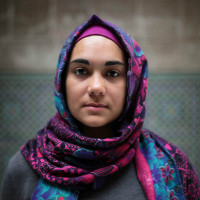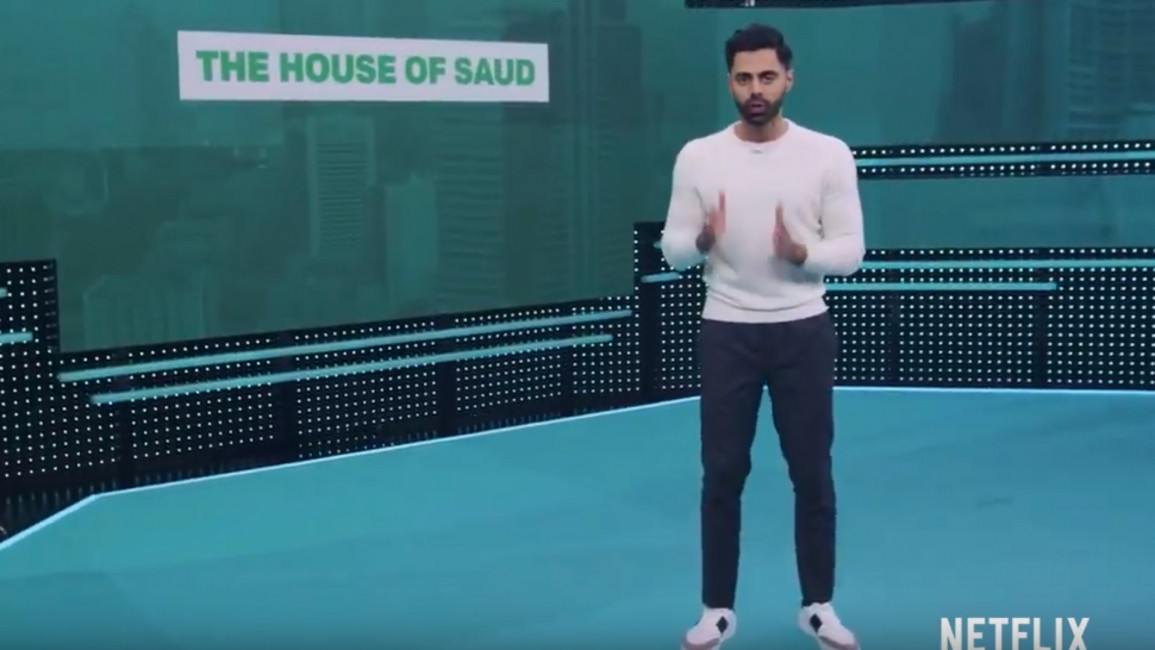
Netflix evolves from entertainer to censorship enforcer
In the second episode of Patriot Act, which was released in late October but was pulled this week, comedian Hasan Minhaj mocks the Saudis' inconsistent account of the murder of journalist Jamal Khashoggi, which the CIA concluded was ordered by the Saudi crown prince Mohammed bin Salman. He also criticises American officials and celebrities for rolling out the red carpet for the crown prince during his visit to the United States last spring.
Read more here: Netflix drops satire episode critical of Saudi Arabia after official complaints
A large portion of Minhaj's cutting monologue, which is still available to watch in Saudi Arabia on Netflix's YouTube channel – is aimed squarely at destroying the once-popular narrative of Mohammed bin Salman as a reformist.
The comedian lambasts the detention of up to 500 Saudi royals, politicians and businesspeople in late 2017, the continued imprisonment of female activists who campaigned for the right to drive – despite the legalisation of women driving – and the brutal and deadly bombardment of Yemen, with United States' weapons, which has led to what is fast-becoming the worst famine for 100 years.
 |
The comedian lambasts the detention of up to 500 Saudi royals, politicians and businesspeople in late 2017, the continued imprisonment of female activists who campaigned for the right to drive and the brutal and deadly bombardment of Yemen |  |
Saudi Arabia's Communications and Information Technology Commission cited a cyber-crime law as the grounds for the banning of the episode, which aims to restrict the "production, preparation, transmission, or storage of material impinging on public order, religious values, public morals, and privacy, through the information network or computers".
|
Patriot Act is a Netflix original series and the network were well aware of Minhaj's repertoire when they commissioned his show.
The 33-year-old rose to prominence for his political satire on The Daily Show and famously hosted a no-holds-barred 2017 Whitehouse Correspondents dinner, which President Donald Trump did not attend.
"Historically, the president usually performs at the correspondents' dinner," Minhaj said during in the 2017 event, "but I think I speak for all of us when I say he's done far too much bombing this month."
Netflix should be supporting the artists and shows that it signs rather than acquiescing to a vague and misused law. Because it is unclear precisely which part of the Saudi public order/religious/morality/privacy cyber-crime law Minhaj is accused of transgressing.
Was his encouragement of Indian-American children to aim for careers outside of medicine and law considered a desecration of morality? Or did his categorisation of Blake Shelton as the fourth sexiest judge on The Voice violate religious decency?
Perhaps if the Saudi officials had claimed that Minhaj's hair was so extravagantly coiffed that it was an affront public decency then we might have been in agreement.
But no, the kingdom requested this episode be removed because censorship is the only weapon in their arsenal against valid criticism.
 |
The kingdom requested this episode be removed because censorship is the only weapon in their arsenal against valid criticism |  |
Saudi Arabia is currently ranked 169th out of 180 nations in the world for press freedom. With the removal of a stand-up show that presents measured disparagements of a government, Netflix has evolved from entertainment provider, to censorship enforcer. What is to prevent governments from abusing legal procedures in order to restrict the freedoms of its citizens?
Human Rights Watch Executive Director Sarah Leah Whitson tweeted that: "Every artist whose work appears on Netflix should be outraged that the company has agreed to censor a comedy show because the thin-skinned royals in Saudi complained about it."
If Netflix is willing to bend to the demands of a self-conscious autocracy, then who will be next? Perhaps next they might spare President Trump his blushes by censoring episode six of Patriot Act – Immigration Enforcement – in which Minhaj lambasts the American president's simplistic understanding of immigration and suggestively mocks his admiration for Russian President Vladimir Putin. "I thought you liked big strong men?" asks Minhaj.
Read also: Netflix censorship risks helping Saudi crackdown
Maybe some positive could emerge from Netflix's new job description. I would like to formally submit a demand that they withdraw the gaggingly patriotic, cliched and stereotypical Designated Survivor from their repertoire.
Or you know, since I find the show – which follows an inexperienced but well-meaning president - an embarrassment to acting, directing and production, perhaps I could just, you know, be an adult and not watch it.
In response to criticisms, Netflix stated, "We strongly support artistic freedom worldwide and only removed this episode in Saudi Arabia after we had received a valid legal request – and to comply with local law."
But the claim to support artistic freedom falls flat in the face of reality – that a satirical programme was pulled, and that no official has publicly indicated a specific legal grounding for this measure.
 |
If Netflix is willing to bend to the demands of a self-conscious autocracy, then who will be next? |  |
|
The fact that the episode is still available to watch through Netflix's official YouTube channel in Saudi Arabia perhaps mitigated the decision to kowtow to governmental pressure in the minds of Netflix officials.
In reality, it only serves to underline the spinelessness of the gesture. Because it was, of course, never about respecting Saudi law, but about bowing the demands of a regime which rules over a young, target-market population – around two thirds of Saudi's are under 30 years of age.
Netflix stated that complying with local law is in line with the operating standard of other US-based companies, but did not disclose whether it had received other similar government requests.
Neither did they disclose what, if any, due diligence what carried out. In order to avoid becoming a stooge for autocracies, Netflix must implement a transparent and consistent policy that assesses governmental requests for restricted content.
Fortunately, measures to restrict domestic viewing of the episode by the Saudi government have been counter-productive, with the ensuing headlines and controversy ensuring that YouTube figures for the episode sky-rocketed to over 1.5 million views – exceeding the views of other episodes by up hundreds of thousands.
Hasan Minhaj tweeted accordingly, "Clearly, the best way to stop people from watching something is to ban it, make it trend online, and then leave it up on YouTube.
Ruqaya Izzidien is a British-Iraqi freelance writer specialising in social and cultural affairs. Her work has been published in The New York Times, the Guardian, the BBC and Al Jazeera English.
Her debut novel The Watermelon Boys, published by Hoopoe Fiction is out now.
Follow her on Twitter: @RuqayaIzzidien
Opinions expressed in this article remain those of the author, and do not necessarily represent those of The New Arab, its editorial board or staff.




